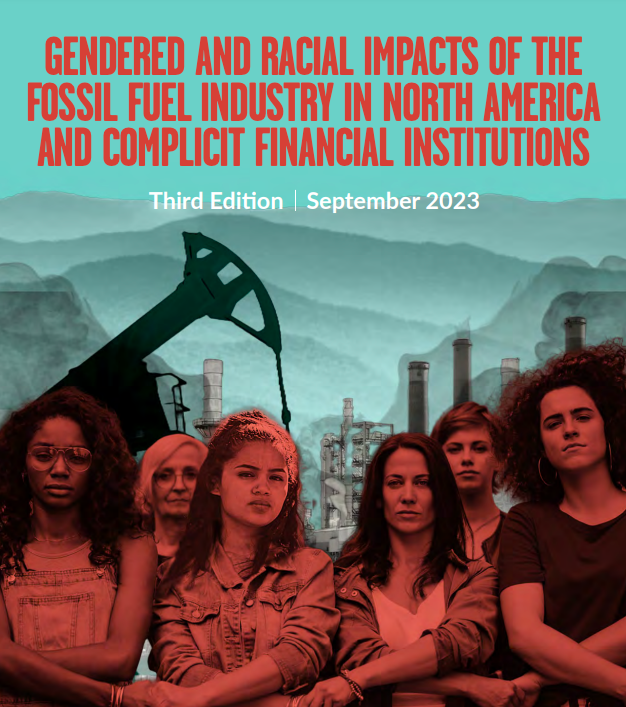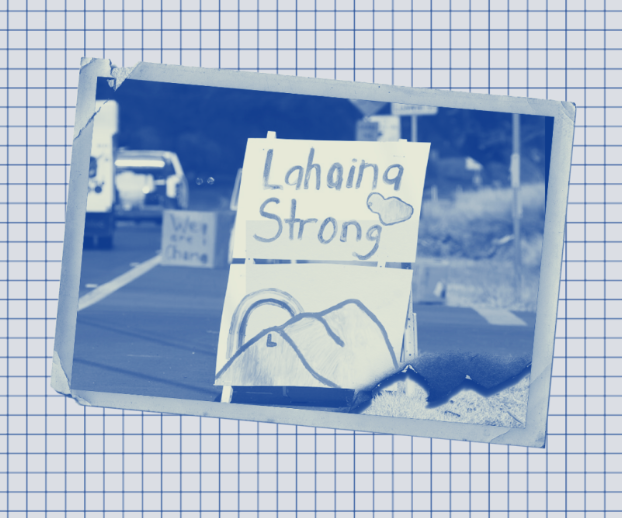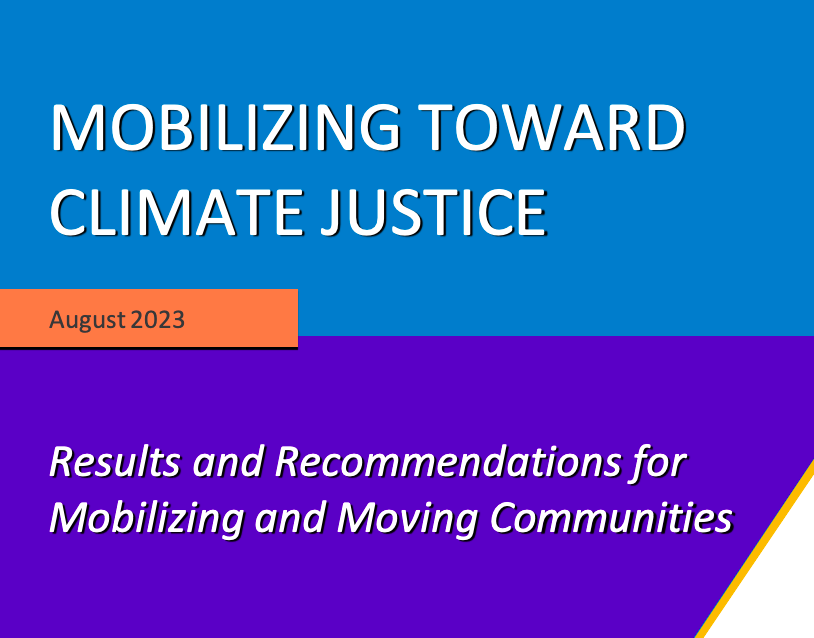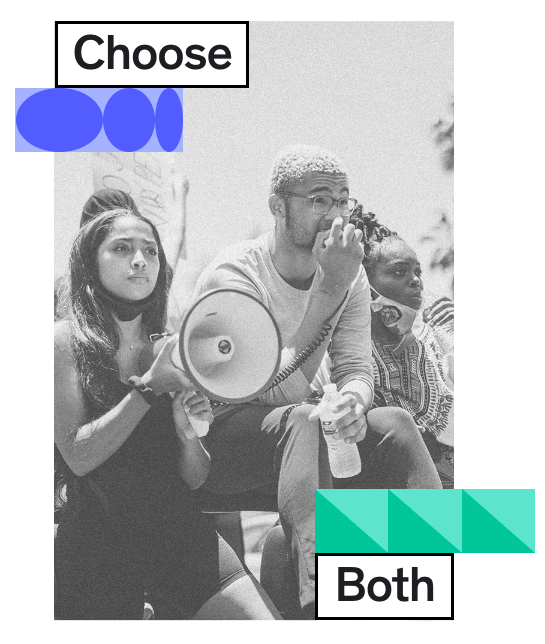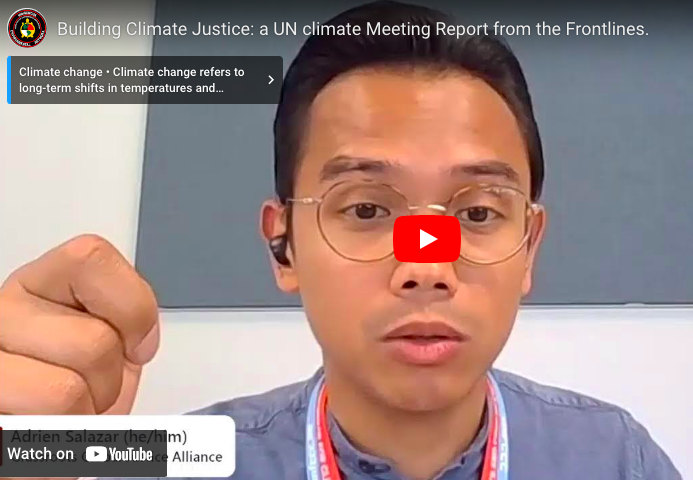Resources
Search below for resources covering the intersection of climate engagement, social science and data analytics.
RESULTS
Gendered and Racial Impacts of the Fossil Fuel Industry in North America and Complicit Financial Institutions
This report finds an indisputable connection between the fossil fuel industry’s practices and negative impacts to African American/Black/ African Diaspora, Indigenous, Latina/Chicana, and low-income women’s health, safety, and human rights in the U.S. and parts of Canada. Specifically, fossil fuel-derived air, water, and soil pollution impact women’s fertility, mental health, and daily work and responsibilities. The negative effects from fossil fuel activity—including extraction, storage and transportation of coal, oil, and gas often in the form of liquefied natural gas (LNG)—stem from direct pollution of communities by fossil fuel companies’ contributions to industrial carbon dioxide and methane. The climate crisis does not and will not affect everyone equally, as factors such as gender, race, and socio-economic status make certain communities significantly more vulnerable to the increasing threats of climate change. Global inequalities, rooted in structural patriarchy, colonialism, white supremacy, and capitalism, continue to place people of the global majority, and specifically women, at risk.
How Americans Are Reacting To The Maui Wildfires
Americans are making the connection between natural disasters and climate change and support urgent action on environmental issues. 37% of Americans believed that the recent wildfires in Maui are primarily the result of climate change, while a similar share (36%) said these events just happen from time to time, and 21% said they weren’t sure. But under those topline numbers, there’s a big partisan divide. According to the poll, 63% of voters who supported President Biden in 2020 think that the recent wildfires in Maui are primarily the result of climate change, while the same share of Trump voters just think these things happen from time to time. Most Americans agree that the weather across the U.S. has gotten weirder — and in some cases, deadlier — over the past few years. According to an Ipsos poll conducted in April, two-thirds (67%) of respondents agreed that unusual weather for the season has gotten more frequent in their area than compared to 10 years ago, and a solid majority (60%) thought the weather has also become more intense.
How to incorporate climate justice in the language classroom
Language teachers have a key role in ensuring that students not only engage with the climate crisis but with climate justice too. Developing students’ understanding of these cause-and-effect connections that affect people around the world is just one of the aspects to focus on the language classroom to raise awareness of climate justice. To engage students and teach them the importance of cross-disciplinary collaborations, consider teaming up with other teachers for projects and involve students in decision making as much as possible.
Mobilizing Toward Climate Justice
Mobilize community members as a choir in support of robust climate interventions that center people of color and exert pressure on elected leaders, government agencies, and corporations to put renewable and regenerative power in the hands of impacted communities. The following messaging guidance is helpful. Frame the issues and impacts of the climate crisis in terms of lived experience and creation of good as opposed to removal of something bad or abstract ideas. Use active voice – name culprits and provide origin story for the climate crisis. Lead with the experience and solutions that communities of color bring to addressing climate change rather than the harms that disproportionately impact them. Focus on how public utilities can lower costs, provide more reliable energy, and empower the community. Call out corporations and their greed. Don’t use comparison to existing public goods. Share positive stories of publicly owned utilities. Avoid naming disparities without assigning blame. Effective culprits here are corporate CEOs, fossil fuel corporations, wealthy few who profit off polluting our communities. Link action to past victories and power of collective action (i.e. “the many can defeat the money”). Give examples of what solutions that prioritize communities of color look like. Combine calls to action, such as holding fossil fuel corporations accountable, with a vision for the better future we will create. Give people political actions to take or they will default just to direct aid. Make it clear who is at fault for the disasters that we face.
You Can Win Bold Climate Laws in Your State
New York State passed the Build Public Renewables Act in May 2023. In this resource, Olúfẹ́mi O. Táíwò spoke with three organizers from the NYC-DSA Ecosocialist Working Group who campaigned for the legislation. Socialists in New York City spearheaded the Build Public Renewables Act (BPRA) to authorize and mandate the public power authority, the New York Power Authority (NYPA), to build, develop, and own renewable energy in the state to meet the climate goals set in 2019 to decarbonize the state’s energy system. DSA also wanted to create discounted utility rates for low- to moderate-income communities because people are struggling to pay their energy bills, as well as close down all of NYPA’s gas peaker plants, which are primarily located in Black and brown neighborhoods. The campaign built relationships with environmental justice organizations like WE ACT, other DSA chapters, groups like Sane Energy Project, For the Many, Food & Water Watch, and Sunrise NYC—and it was tougher to power map to get labor unions to support the bill and get it over the finish line. DSA-endorsed legislators were crucial to pushing the policy inside the state legislature. This long-form interview includes many other descriptions of the campaign.
Choose Both
Choose Both is a collection of movement builders, supporters, and mobilizers helping partners realize a more open, just, and habitable world. They believe that pursuing equity for marginalized folks is the only way to get there. They work with storytellers, campaigners, designers, and more transforming the way that organizations and initiatives take on racial equity as an impact priority. Choose Both identified 5 key decision-points where these partners can choose both equity and evidence to strengthen their impact. First, choose goals that both capture new visions and meet existing needs. Second, choose storytelling that’s both emotional and technical. Third, choose to reach both loyal audiences and new communities. Fourth, choose to both consider data and challenge bias. Fifth, choose reporting that both inspires your own community and accounts for others.
Charging Toward Justice: How States Can Lead on Racial and Economic Equity through the National Electric Vehicle Infrastructure (NEVI) Program
Deeper community engagement is important as states complete build-out of the initial electric vehicle charger deployment along highways. To do outreach to communities, employ a wide range of outreach strategies to disadvantaged communities, including social media, email lists, local media, and campaigns targeted specifically to communities of color (Black, Brown and Indigenous communities); hold a mix of virtual and in-person meetings, including within disadvantaged communities, to achieve broad geographic and demographic representation; consult with community-based organizations, especially those that represent disadvantaged communities, throughout the NEVI planning process; actively solicit feedback from disadvantaged communities through virtual and in-person meetings, listening sessions, public surveys, and recommendations from community-based organizations; and engage tribal nations, who were often entirely omitted from state NEVI planning but should directly benefit from the program.
Building Bridges and Growing the Soul of Chicago: A Blueprint for Creating a More Just and Vibrant City for All
New Chicago Mayor Brandon Johnson is taking climate justice seriously. The environmental justice subcommittee of the mayor’s transition team insists on taking a holistic view of environmental issues including water safety, access to energy and safe housing, and issues of pollution and climate change. The issue of wealth disparity and racism resurface in this report as issues embedded in the way environmental issues have unfolded. Environmental racism is real. They invite us to see the rubric of a “just transition,” and the policy framework of a “Green New Deal” for Chicago as guiding principles for efforts to realize a cleaner, healthier, more just, and sustainable city. In additional to a cleaner, safer, more reliable public transportation trains and busses, accessibility and affordability at all levels, and ample bike paths, an expansive view of Transportation must also factor in racism (such as racial profiling in traffic stops). Access to clean, safe reliable transportation is related to economic security, economic vitality and an overall cleaner environment. The transportation subcommittee insisted the City “needs to work with community in planning transportation strategy.” Again, the importance of engagement and ongoing accountability were uplifted in the transportation subcommittee report as they were in all the other groups.
Deep Canvassing Lessons Learned with Kentuckians for the Commonwealth
Join Kentuckians for the Commonwealth to learn more about their deep canvassing efforts, lessons learned, and best practices from their on-the-ground experience. During this webinar, participants will hear from the folks involved about how deep canvassing can be a powerful tool for bringing new people into the climate justice movement as well as how learnings might be applied to other climate deep canvass and relational conversation programs across the country.
Members of the It Takes Roots delegation discussed important achievements in UNFCCC history, such as the Kyoto Protocol and Paris Accord, with a special focus on Article 6 of the Paris Accord, which allows the biggest polluters to continue unabated by buying and selling “pollution credits” through carbon markets. They emphasized the importance of denouncing false solutions, preserving human rights and Indigenous rights, and understanding that a just transition moves us away from fossil fuels immediately. “When they’re talking about hydrogen, carbon capture, forest management and whatever… it’s not going to be in rich white neighborhoods, not in any place other than communities that are already overburdened and affected by the legacy of dirty energy,” said José Bravo, executive director of Just Transition Alliance.
Pagination
- Previous page
- Page 4
- Next page
